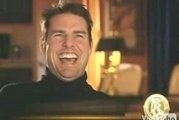TV Maven: Tom Cruise on Video: Web a Threat to Scientology's Secrets
By Elaine Liner Elaine Liner Archives

You can’t put toothpaste back in the tube and it looks like the Church of Scientology won’t be able to wrest back total control of that Tom Cruise Scientology video.
The 9-minute clip of Cruise’s passionate testimonial about the powers and responsibilities of Scientologists popped up on the Internet via YouTube, Gawker and other sites a few weeks ago. There’s also footage available of the actor receiving a gaudy “Freedom Medal” from the religion’s top leader, David Miscavige, at a Los Angeles ceremony. In both videos, Cruise employs Scientology shorthand, speaking of “KSW” (Keeping Scientology Working) and “SPs” (Suppressive Persons, or those who criticize Scientology). He seems downright giddy as he talks about his beliefs and of being able to “create new realities.”
Very quickly, the always-litigious church got the videos pulled, claiming copyright infringement. The Church of Scientology maintains copyrights to the works of the religion’s founder, the late L. Ron Hubbard, through its Religious Technology Center, and they claim the writings contain “trade secrets.”
But it’s not so easy to hold onto this material anymore. Once it’s out there, it’s out there. Web site Gawker.com defied a strongly worded letter from the church’s legal machine and reposted the video. The footage was then copied, imitated and spoofed all over the ’net. (Gawker has kindly gathered all the parodies, including those by Stephen Colbert, Conan O’Brien and Craig Ferguson, in this video round-up.) By rough estimates, the original video has been viewed on YouTube more than 4 million times (it's hard to get a total, since the video has been posted, removed and re-posted many times).
One clever fellow simply transcribed the original Cruise footage-—in which the actor ardently states that Scientologists are the world’s top “experts on the mind”—and re-recorded it on video in his own voice. Others cloned the footage and put it back on YouTube under camouflage titles such as "Cute Puppies."
The Church of Scientology is well known among media as an organization tough to penetrate and difficult to criticize because of their tendency to sue for libel or to “fair game” (CoS-speak for using intimidation on) anyone who dares point out the particularly weird aspects of the church’s beliefs (Xenu, anyone?). Remember the controversy over that SouthPark episode? Check out this clip from a BBC documentary about the church that also includes a SouthPark snippet.
The church has successfully sued some of its ex-members and critics for posting “secret” documents from the religion on the Web. But consider the legal action regarding a Timemagazine exposé of Scientology in 1991 that went on for nearly five years, with Time-Warner spending a reported $7 million to defend its characterization of the religion as a “cult of greed.” In 1996 a judge finally threw out the church’s claims of libel, citing the magazine’s First Amendment rights. That’s just about the same year the general public began logging on regularly to the Internet and discovering its almost boundary-free possibilities for disseminating information others don’t want seen.
The Web now might be too big and unwieldy for the Church of Scientology when it comes to trying to control how its materials are used and how its celebrity believers are portrayed. Tom Cruise’s public couch-jumping and Brooke Shields-bashing a couple of years back, plus his subsequent appropriation of all things Katie Holmes, gave evidence to how his devotion to Scientology might be affecting his public image. He went from being Rosie O’Donnell’s favorite “cutie patootie” to looking like a wild-eyed, angry weirdo whose third marriage seemed like a ploy to prop up his fading rep as a romantic lead. Firing his longtime publicist Pat Kingsley, being fired from Paramount by Viacom chief Sumner Redstone, having his latest film, Lions for Lambs, slip into oblivion…not good.
Cruise’s most honest performance in years has him grinning manically above his black turtleneck in the now-ubiquitous Scientology video. This is the real Tom Cruise, bursting out laughing for no reason and going on about how living as a Scientologist is “wild and woolly” and “rough and tumble.” (Play some clips of Cruise as huckster T.J. Mackey in Magnoliaand you can see that role wasn’t such a stretch.)
In Cruise’s next movie, Valkyrie, he plays a Nazi. Watching how he stiffly salutes “LRH” in the Scientology Freedom Medal award clips, it's almost too easy to draw some eerie parallels. The actor may have jumped the shark when he leapt on Oprah’s couch, but now he’s clearly vaulted beyond the tipping point careerwise. In the Golden Age of Hollywood, he would've been pegged "box office poison."
In the days after the Cruise videos appeared, Scientology’s own Web site crashed from the crush of new traffic, and from an attack by hackers. Little of the information the church reveals about itself, however, is as intriguing as what the media, from CNN’s Anderson Cooper to BBC’s Panorama to A&E’s Investigative Reports, have let viewers see in the past.
The Time article did some of the best and toughest reporting, calling Scientology a “ruthless global scam” posing as a religion. The cover story said outright that it was not a religion at all, but a cult obsessed with making money.
Scientology was founded in 1954 by Hubbard, a science-fiction writer who once echoed George Orwell in saying that for a man to make a million bucks, he should “start his own religion.” The church lures newcomers with free “stress tests” and eventually requires its members to take courses and undergo training and counseling that can cost thousands or even hundreds of thousands of dollars.
The film and TV industries boast lots of believers in Scientology, including actors, writers, directors and one of Hollywood’s top acting coaches, Milton Katselas. Author Andrew Morton claims in his just-published unauthorized biography of Cruise that the actor holds the No. 2 spot in the church, just under Miscavige.
The church says it has 10 million members worldwide. Critics, ex-members and investigative journalists have pegged the real number closer to 50,000, as Scientology classifies as “members” anyone who has ever bought one of Hubbard's books or taken one of the “stress tests,” even if they never step foot in a Scientology center again.
All the hubbub about the Cruise videos certainly has brought new attention to the mysterious religion and to Cruise’s belief in it. Only hardcore members like Cruise are supposed to be privy to this sect’s sacred truths. But the new reality of new media and its ability to reveal those secrets and to expose the behavior of its inner circles may force Scientology to respond to new sources of scrutiny in ways other than threats of lawsuits.


